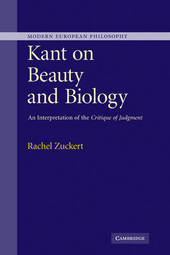
|
Kant on Beauty and Biology: An Interpretation of the 'Critique of Judgment'
Hardback
Main Details
| Title |
Kant on Beauty and Biology: An Interpretation of the 'Critique of Judgment'
|
| Authors and Contributors |
By (author) Rachel Zuckert
|
| Series | Modern European Philosophy |
|---|
| Physical Properties |
| Format:Hardback | | Pages:424 | | Dimensions(mm): Height 229,Width 152 |
|
| Category/Genre | History of Western philosophy |
|---|
| ISBN/Barcode |
9780521865890
|
| Classifications | Dewey:193 |
|---|
| Audience | | Professional & Vocational | |
|---|
|
Publishing Details |
| Publisher |
Cambridge University Press
|
| Imprint |
Cambridge University Press
|
| Publication Date |
30 August 2007 |
| Publication Country |
United Kingdom
|
Description
Kant's Critique of Judgment has often been interpreted by scholars as comprising separate treatments of three uneasily connected topics: beauty, biology, and empirical knowledge. Rachel Zuckert's book interprets the Critique as a unified argument concerning all three domains. She argues that on Kant's view, human beings demonstrate a distinctive cognitive ability in appreciating beauty and understanding organic life: an ability to anticipate a whole that we do not completely understand according to preconceived categories. This ability is necessary, moreover, for human beings to gain knowledge of nature in its empirical character as it is, not as we might assume it to be. Her wide-ranging and original study will be valuable for readers in all areas of Kant's philosophy.
Author Biography
Rachel Zuckert is Assistant Professor in the Department of Philosophy at Northwestern University.
ReviewsReview of the hardback: '... impressive in its intellectual scope, its clearly-written quality, its well-informed, considerable citation of the secondary literature in Kant scholarship and its manner of arguing for a variety of nuanced positions that arise within the text's many subthemes. It is a contribution that stands solidly on the shoulders of the presently leading Kant scholarship and that integrates itself well into it.' British Journal for the History of Philosophy
|